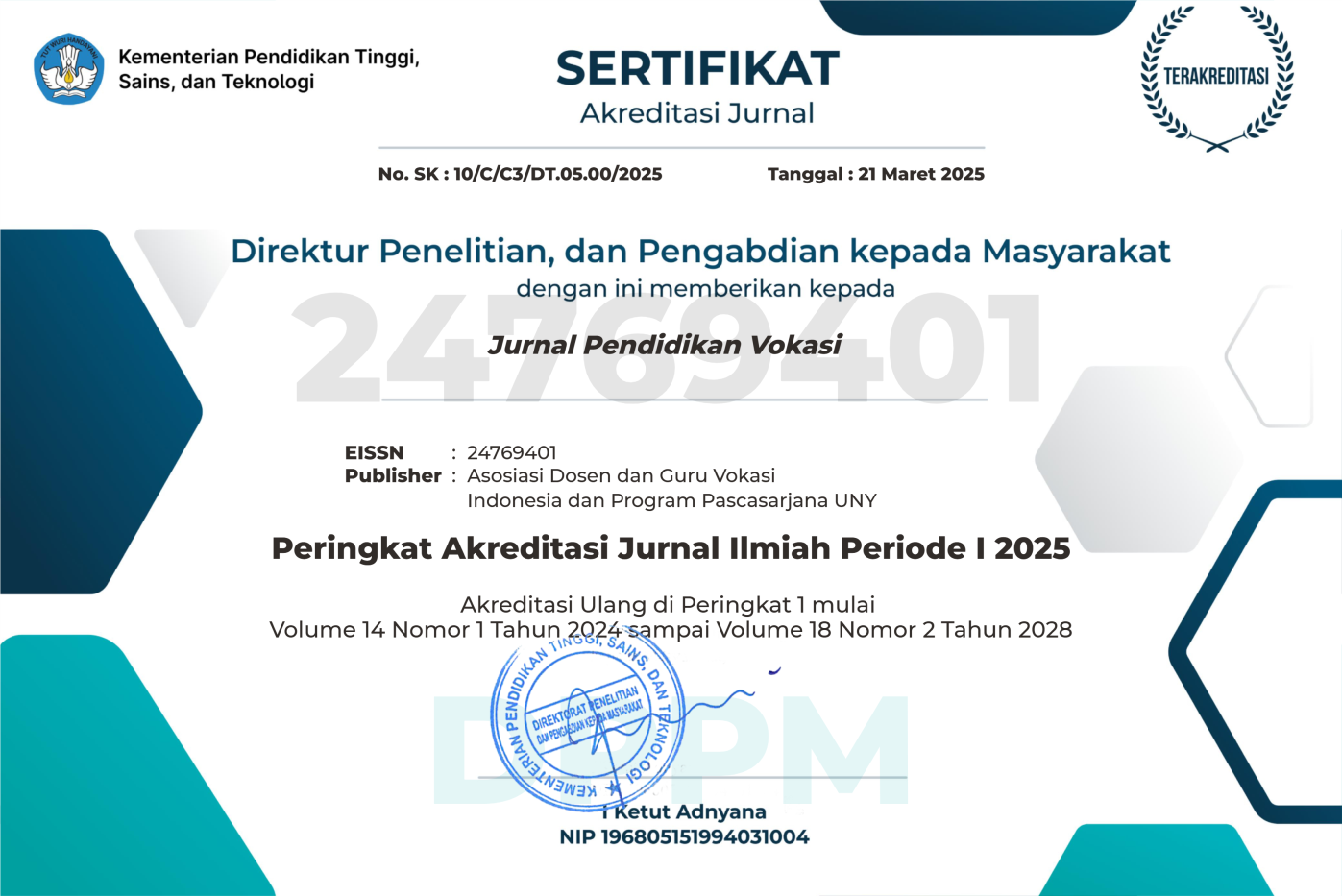Implementation of problem-based learning to improve problem-solving skills in vocational high school
DOI:
https://doi.org/10.21831/jpv.v10i2.31210Keywords:
problem solving skills, problem-based learning, vocational high schoolAbstract
The learning process in Vocational High Schools must encourage students to have problem-solving skills needed in the industry through the application of appropriate learning models. In reality, the students' problem-solving skills in computer subjects and basic networks are still lacking, and the Problem-Based Learning learning model has never been applied. This research aims to understand the implementation of Problem-Based Learning (PBL) to improve students' problem-solving skills. This research is a class action research model of Kemmis and Taggart, carried out in three cycles; each cycle consisted of two meetings. The data were analyzed descriptively. The results show how PBL on computer subjects and basic networks can improve problem-solving skills. Improvements occurred in all aspects of observation. In problem-solving skills, 56.25% of the students in the above medium category in cycle I increased in cycle II to be 71.875% and increased again in cycle III to be 100%. This means that there are no students below the medium category in cycle III. PBL can improve problem-solving skills with the steps: (1) orienting students to the problem classically; (2) organizing students to study in a group work of four people and the division of tasks for each member; (3) guiding individual and group investigations on the same topic, discussed maximum in two groups; (4) developing and presenting the work done in front of the class with more time allocation in the discussion session; (5) analyzing and evaluating the problem-solving process that focuses on re-checking the results.
References
Amir, M. T. (2009). Inovasi pendidikan melalui problem based learning. Kencana Prenada Media Group.
Arends, R. I. (2008). Belajar untuk mengajar (H. P. Soetjipto & S. M. Soetjipto (Trans.)). McGraw Hill.
Awang, H., & Ramly, I. (2008). Creative thinking skill approach through problem-based learning: Pedagogy and practice in the engineering classroom. International Scholarly and Scientific Research & Innovation, 2(4), 334–339. https://doi.org/10.5281/zenodo.1084906
Delisle, R. (1997). How to use problem-based learning in the classroom. ASCD.
Duch, B. J., Groh, S. E., & Allen, D. E. (Eds.). (2001). The power of problem based learning: A practical "how to" for teaching undergraduate courses in any discipline. Stylus Publishing.
Griffin, P., & Care, E. (2015). Assesment and teaching of 21st century skills: Methods and approach. Springer.
Kadir, Z. A., Abdullah, N. H., Anthony, E., Salleh, B. M., & Kamarulzaman, R. (2016). Does problem-based learning improve problem solving skills?"”A study among business undergraduates at Malaysian premier technical university. International Education Studies, 9(5), 166–172. https://doi.org/10.5539/ies.v9n5p166
Klegeris, A., & Hurren, H. (2011). Impact of problem-based learning in a large classroom setting: Student perception and problem-solving skills. Advances in Physiology Education, 35(4), 408–415. https://doi.org/10.1152/advan.00046.2011
Major, C. H., & Palmer, B. (2001). Assessing the effectiveness of problem"‘based learning in higher education: Lessons from the literature. Academic Exchange Quarterly, 5(1), 4–9. http://www.rapidintellect.com/AEQweb/mop4spr01.htm
McTaggart, R. (1994). Action research: A short modern history. Deakin University.
Nuralam, N. (2009). Pemecahan masalah sebagai pendekatan dalam belajar matematika. Jurnal Edukasi, 5(1), 142–154.
Nurhadiyanto, D., & Wagiran, W. (2007). Problem-based learning alternatif solusi dalam menyiapkan SDM holistik di SMK. Seminar Nasional Telisik Hambatan Pelaksanaan SMK Dan Solusinya, Jurusan Pendidikan Teknik Mesin UNNES, 1–14.
Partnership for 21st Century Skills. (2008). 21st Century skills, education & competitiveness: A resource and policy guide. 21st Century Skills.
Regulation of the Minister of National Education of Republic of Indonesia No. 22 of 2006 on the Content Standard for Primary and Secondary Educational Units, (2006).
Rokhmawati, J. D., Djatmika, E. T., & Wardana, L. (2016). Implementation of problem based learning model to improve students' problem solving skill and self-efficacy (A study on IX class students of SMP Muhammadiyah). IOSR Journal of Research & Method in Education (IOSR-JRME), 6(3), 51–55. https://doi.org/10.9790/7388-0603045155
Sanjaya, W. (2009). Strategi pembelajaran berorientasi standar proses pendidikan. Kencana Prenada Media Group.
Selí§uk, G. S., í‡aliÅŸkan, S., & Åžahin, M. (2013). A comparison of achievement in problem-based, strategic and traditional learning classes in Physics. International Journal on New Trends in Education and Their Implications, 4(1), 154–164. http://ijonte.org/FileUpload/ks63207/File/14.selcuk.pdf
Simamora, R. E., Sidabutar, D. R., & Surya, E. (2017). Improving learning activity and students' problem solving skill through Problem Based Learning (PBL) in junior high school. International Journal of Sciences: Basic and Applied Research, 33, 321–331.
Simamora, S. J., Simamora, R. E., & Sinaga, B. (2017). Application of problem based learning to increase students' problem solving ability on Geometry in class X SMA Negeri 1 Pagaran. International Journal of Sciences: Basic and Applied Research (IJSBAR), 36(2), 234–251. https://www.gssrr.org/index.php/JournalOfBasicAndApplied/article/view/8100
Sofyan, H., Wagiran, W., & Komariah, K. (2016). Problem based learning dalam implementasi Kurikulum 2013 di SMK. K-Media.
Sofyan, Herminarto, & Komariah, K. (2016). Pembelajaran problem based learning dalam implementasi Kurikulum 2013 di SMK. Jurnal Pendidikan Vokasi, 6(3), 260–271. https://doi.org/10.21831/jpv.v6i3.11275
Sudira, P. (2018). Metodologi pembelajaran vokasional abad XXI. UNY Press.
Susanti, H., Hobri, H., & Susanto, S. (2016). How to improve students' creative thinking skills in learning Prism Nets through problem-based learning? International Journal of Scientific Research and Management, 5(8), 6789–6793. https://doi.org/10.18535/ijsrm/v5i8.28
Wagner, T. (2008). The global achievent gap. Basic Books.
Yeo, J., & Tan, S. C. (2014). Redesigning problem-based learning in the knowledge creation paradigm for school science learning. Instructional Science, 42(5), 747–775. https://doi.org/10.1007/s11251-014-9317-6
Downloads
Published
How to Cite
Issue
Section
Citation Check
License
The authors submitting a manuscript to this journal agree that, if accepted for publication, copyright publishing of the submission shall be assigned to Jurnal Pendidikan Vokasi. However, even though the journal asks for a copyright transfer, the authors retain (or are granted back) significant scholarly rights.
The copyright transfer agreement form can be downloaded here: [JPV Copyright Transfer Agreement Form]
The copyright form should be signed originally and sent to the Editorial Office through email to jpvokasi@uny.ac.id
Jurnal Pendidikan Vokasi by http://journal.uny.ac.id/index.php/jpv is licensed under a Creative Commons Attribution-ShareAlike 4.0 International License.












